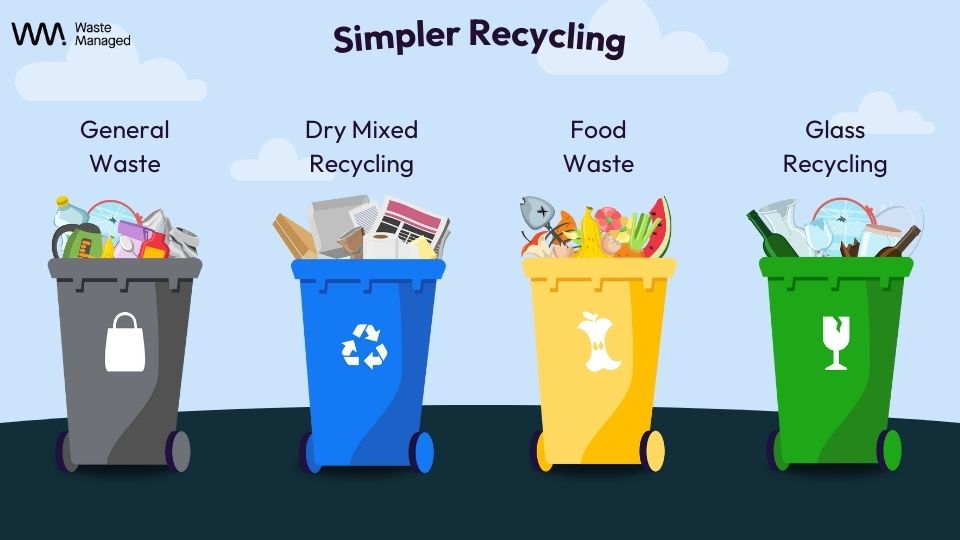
By 2024, the UK government plans to introduce mandatory digital waste tracking across the country, aiming to create a comprehensive system for monitoring the vast amount of waste generated annually, exceeding 200 million tonnes.
This initiative seeks to shed light on the origin, handling, treatment, and final destinations of waste in order to establish a thorough understanding of waste management practices.
Presently, there is no standardised approach for tracking waste throughout the UK.
Over the years, various legislations have been introduced to regulate different aspects of waste transport, management, and descriptions.
As a result, waste data is collected through a patchwork of private contractors and government entities, using a mix of digital and paper-based systems.
The introduction of mandatory digital waste tracking aims to centralise and streamline this process.
This guide will provide you with a better understanding of what mandatory digital waste tracking entails, its motivations, potential implementation methods, and its implications for businesses.

Mandatory Digital Waste Tracking Consultation
In a collaborative effort, the UK, Scottish, and Welsh governments, along with the Department of Agriculture, Environment and Rural Affairs in Northern Ireland, conducted a comprehensive consultation on the proposed implementation of mandatory digital waste tracking.
The consultation, which ran from January 21, 2022, to April 15, 2022, garnered a total of 713 responses from various stakeholders such as waste producers, waste transportation companies, waste site operators, local authorities, waste brokers, and business representative organisations.
The consultation revealed several noteworthy findings, including:
- A significant 79% of respondents expressed agreement with tracking controlled waste, encompassing hazardous and non-hazardous household, commercial, and industrial waste, as well as extractive waste derived from quarries.
- An overwhelming 84% of respondents believed that destination details for all waste movements should be tracked, and 79% emphasised the importance of capturing information regarding the individuals responsible for classifying the waste.
- Approximately one-third of respondents estimated that the transition to real-time recording for movements or transfers of hazardous waste could take between one to three years.
- Similarly, 40% of respondents estimated a similar timeframe for transitioning to real-time recording for non-hazardous waste movements or transfers.
- Almost 39% of respondents proposed that waste carriers should provide details of waste movements 24 hours in advance for both hazardous and non-hazardous waste.
- Nearly 75% of respondents supported proposed penalties and enforcement measures, which included fixed monetary penalties for failing to register on the waste tracking service when required and variable monetary penalties for knowingly providing incomplete or false information in the digital records.
- Respondents identified several common barriers to real-time recording, such as costs, time constraints, adoption of the service by clients or suppliers, access to technology, availability of resources, training, and the process of integrating existing systems.
What Types of Waste Will Be Tracked?
Under the proposed mandatory digital waste tracking service, all forms of waste will be subject to tracking.
This includes hazardous and non-hazardous waste, green waste, extractive waste originating from quarries, as well as commercial and industrial waste in all its variations.
Consequently, this tracking service will impact businesses across the board, regardless of the types and quantities of waste they generate.
When Will Mandatory Digital Waste Tracking Be Implemented?
The UK government has not provided a specific timeline for the implementation of mandatory digital waste tracking.
However, it is tentatively scheduled to be launched in either 2023 or 2024, dependent on the progress of IT development and the transition requirements that businesses must meet.
Why is Digital Waste Tracking Being Introduced?
The introduction of mandatory digital waste tracking aligns with the commitments outlined in the ‘Resources and Waste Strategy for England,’ a publication by the Department for Environment, Food & Rural Affairs (DEFRA) and the Environment Agency in 2018.
The strategy sets out objectives to minimise waste, promote resource efficiency, and transition towards a circular economy, thereby conserving valuable material resources.
What are the Objectives of Implementing Mandatory Digital Waste Tracking?
- To gain a comprehensive understanding of waste management practices, enabling informed decisions for improvement in recycling, recovery, and disposal methods.
- To enhance sustainability practices by providing waste producers and managers with accurate data regarding waste production and management, facilitating effective decision-making and proactive changes to improve sustainability.
- To centralise and digitise waste data, consolidating information from disparate digital and paper-based systems into one comprehensive platform.
- To streamline waste reporting processes, replacing laborious paper-based tracking and reporting methods with an integrated system that saves time for waste companies and ensures compliance with waste reporting requirements.
- To combat waste-related crimes, such as fly-tipping, illegal waste exports, and the operation of unauthorised waste sites. By introducing digital waste tracking, the authorities aim to make such criminal activities more challenging to carry out.
How will Digital Waste Tracking Work?
While the specific details of the UK government’s mandatory waste tracking service are yet to be disclosed, it’s expected to involve the submission of information pertaining to waste types, quantities, waste carriers, destinations, disposal methods, and other relevant details.
Such information is likely to be required for each waste load leaving a business.
The responsibility for entering tracking information remains ambiguous at this stage.
As a business generating waste, it may be incumbent upon you to provide the data, or it may fall to the waste carrier, broker, or management company responsible for collecting your waste.
The potential costs associated with digital waste tracking have not been disclosed thus far.
What Will Businesses Need to Do?
Once the mandatory digital waste tracking service becomes operational, businesses can anticipate replacing their paper documents with digital records to track waste.
It’s likely that registration for the service will be mandatory, possibly involving a fee.
To avoid mistakes and potential penalties, it is crucial to gather comprehensive information about your waste well in advance.
Collaborating with waste management partners, carriers, and brokers will help determine the types and quantities of waste your business generates, as well as their frequency and destinations.
This preparation will provide insight into the information you will need to provide once the tracking service goes live.
Understanding who will be responsible for entering the data when mandatory digital waste tracking is enforced is also essential.
Remaining vigilant for further updates on mandatory digital waste tracking and maintaining open communication with your current waste service provider will ensure a smooth transition as the new system is implemented.
About the Author

Steve Traviss
Procurement & Sustainability Officer
Steve Traviss is MCIPS Chartered and is extremely passionate about the environment and corporate responsibility when it comes to sustainable waste disposal practices. Steve truly embodies everything we stand for at Waste Managed and in 2022, Steve took part in a world record scuba beach clean up in Thailand which we’re incredibly proud of him for. Steve researches and writes a lot of our blog content on our website and draws off of a wealth of experience in the waste management industry and knowledge of UK environmental legislation.








